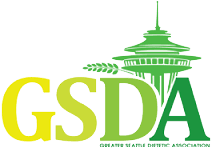The Divergence and Intersection of Nutrition and Mental Health Care: What is the scope of practice?
By Sarah Douglas (she/her), student MSN/MACP

Food and feelings are inextricably intertwined. While Nutrition and Mental Health are incredibly divergent fields in practice, it is a constant challenge to stay in one’s lane. Ultimately legal and ethical standards exist to hold practitioners accountable to their area of expertise and Medicare standards will only allow compensation for one service or the other. However, in practice, this is a murky grey area to attempt to navigate.
RDNs in Washington state can start by reviewing the AND’s Scope and Standards pieces revised in 2017 with a decision-making algorithm resource. For more specific standards within the state which also apply to CNs, the Department of Health website provides guidance with access to the Washington Administrative Code and Revised Code of Washington. While these resources are dense with information, they are intentionally built to be vague to provide wiggle room for the vast variety of the field.
Now that the busy professional has spent precious free time wading through legal documents attempting to interpret the jargon, it seems fair to discuss practical and actionable guidance. The AND standards require RDNs and CNs to complete 1 course covering nutrition counseling and 1 course covering ethics during their education. This can feel like a brief time within a lengthy training process to attempt to gain competence in providing appropriate counseling. RDNs receive more intensive guidance regarding scope of practice and counseling from preceptors during the dietetic internship. This valuable, action based education forms the remainder of the requisite foundation for RDNs. Once a nutrition practitioner enters the field as a licensed professional, they must rely on clinical judgement and experience to guide their practices.
Some professionals are guided by the principle that it is within a nutrition professional’s scope of practice to discuss emotions as they relate to food. This could include the following:
Client’s relationship to food
Intuitive eating
Mindful eating
Emotional eating
Body image work related to food
Health at Every Size work related to food
Diet culture work
Barriers to change, inequity in nutrition, and motivation in nutrition changes as they are impacted by mental health.
Outside of clinical practice this could also include areas in community and foodservice related to advocacy, inequity, and social justice.
Each individual must rely on the valuable clinical judgement they develop, hone, and adapt throughout a career. It is crucial to engage in ongoing self reflection regarding one’s personal capacity, biases, strengths, and competency in providing nutrition care related to mental health and emotions. This includes utilizing supervision, peer consultation, ongoing training, and literature review. This also depends greatly on integrated care that utilizes a multidisciplinary team. For example, in most modern eating disorder treatment, a client receives care from both an RDN or CN as well as a therapist (LMHC, LMFT, or LSW) in addition to a medical provider and a psychiatrist. When an individual is cared for by a team, it sets everyone involved up for success.
Bias against mental health care continues to rapidly adjust in 2021. While individuals and societal institutions may have disparate connotations around therapy, it is always appropriate to check in with a client to make sure their mental health is being addressed by a professional. This can be anything from a simple question about the existence of this care and as involved as providing referrals and supporting a client in determining which professionals take their insurance, provide telemedicine, or have schedules that match up. It is a responsibility of nutrition providers to aid clients in removing barriers to overall wellbeing.
What about the elusive professional with expertise in both nutrition and mental health? There is an emerging intersection of caregivers that specialize in both nutrition and mental health. This could be a CN, LMHC graduating from Bastyr’s dual track graduate program. This could also be an individual who returned for a nutrition or mental health-related education after already completing the first. These folks are cropping up in popular culture, such as the host of the podcast Food Psych, Christy Harrison. These folks are also found within the Seattle area in integrated clinics including Sunrise Nutrition, Have Heart Wellness, and Liberating Jasper. These caregivers can also be found individually such as Bonnie Deopp, CN, LMHC, Ying Yu, CN, LMCH, Emma Doerner, CN, LMHC-A, Erica Mouch, RDN with psych BA, and Andrew Zarate RDN, LSWAIC. These intrepid trail blazers are creating a space for combined nutrition and mental health counseling. However, they are also limited in the overlap of care they are allowed to provide. For clients struggling deeply with both nutrition and mental health, they may be better served by a multidisciplinary team if it is within their access.
If you still feel uneasy after reading these perspectives, there is one more incontrovertible technique. Communicate with your client. Starting during your first interaction as you cover informed consent, clarify your role. Make sure to communicate your scope of practice and the boundaries it will be appropriate to keep with your client. Encourage the client to ask questions and get comfortable with continuing this conversation throughout your therapeutic relationship.
Sarah Douglas is a dual-track Graduate student at Bastyr University pursuing education and training in both Nutrition and Counseling Psychology. With a BS in Dietetics from University of Minnesota-Twin Cities, she has been providing nutrition care as a Dietetic Technician at Swedish Medical Center and Center for Discovery for the past several years. In the hours each week she is not at school or work, Sarah loves to cuddle with her cat or run around the woods.
